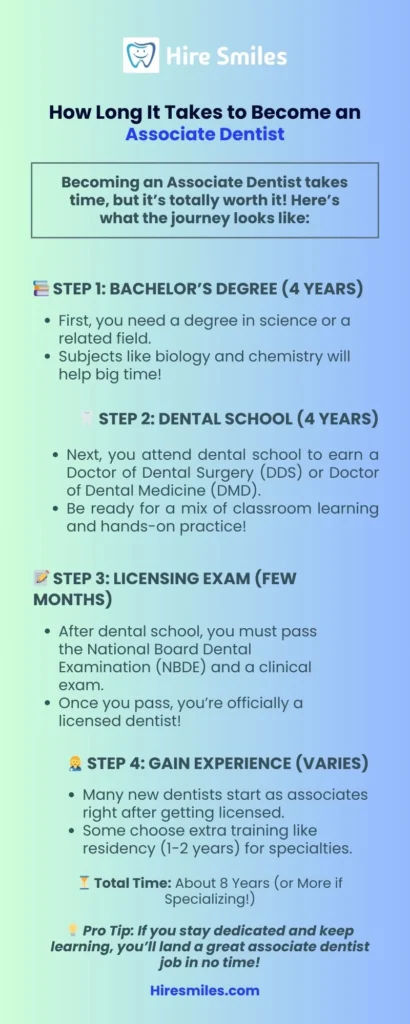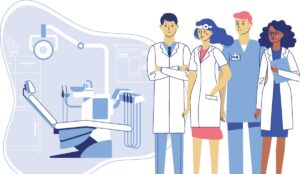Embracing the role of an associate dentist is a thrilling adventure, demanding time and commitment. Various phases are present, encompassing education, training, and certification, assuring you’re properly equipped for the job. Starting from high school graduation, obtaining a dental degree, and clearing mandatory tests—every stage is essential in acquiring the expertise and capability to excel in this profession. The journey might span across years, but the joy of aiding patients with improved dental health and the gratification of an accomplished career is worth it. This blog will tell you step by step how long it takes to become an associate dentist. Continue reading this blog.
What is an Associate Dentist?
An associate dentist, that’s you, in a dental practice where you’re not the owner. Dental associateships—you could be working as an employee or as an independent contractor. The job? Simple—no matter what you choose, examine patients, fix cavities, and teach folks about keeping their teeth and mouth healthy. But if you’re an independent contractor, you must arrange your time. You manage your appointments. You maintain your tools. What do you need? Good at organizing, great with people. Ready to kick-start as a dental associate? All you need is to finish dental school and round off a residency program.
How to Become an Associate Dentist?
To be an associate dentist, you need specific qualifications. They include education, training, and a license. Start with a bachelor’s degree. Then, get into a dental program. You’ll need to pass the Dental Admission Test. Additionally, you have to complete clinical work. Choose your degree—it could be a Doctor of Dental Surgery, Doctor of Dental Medicine, or Doctor of Medical Dentistry. More education will follow. You’ll do a two- to four-year residency and two to five years of advanced training. This helps you grow your skills. Finally, get a license to practice in your state.
Educational Requirements to Become an Associate Dentist
If you want to be a dentist, there are two degrees you need. First, get a bachelor’s degree. Then, finish a dental program. Most students get a bachelor’s degree before starting dentistry. But, if you’re in your last year of college, you might be able to apply to dental school. Once the dental program is over, you have to pass a test to get a dentist’s license. Let’s see it step by step:
Bachelor’s degree
Ready to become a dentist? Start with your bachelor’s degree. Once you have that, apply to dental school. Some schools might let you apply in your last undergraduate year, but that depends on your grades and references. When your bachelor’s is done, take a test to apply for the dental schools.
Doctoral degree
This is where the dental schools come in. They teach students how to be dentists. You’ll learn about different things like teeth, bacteria in the mouth, how to use dentist’s x-rays and biology. The dental program also includes real-world practice. At the end, you’ll get a doctoral degree. It could be a Doctor of Dental Surgery (DDS) or a Doctor of Dental Medicine (DMD).
Specification Training
Dentistry niches In dentistry studies, you get to pick a unique focus within the broad dentistry field. This choice could mean added training based on your specific field and can need another one to three years to complete. For instance, to become an oral surgeon, you might need a six-year program or a four-year residency.
Licensing test
For a formal dentist license, those graduating from dentistry studies must go through the National Dental Examining Board of Canada (NDEB) validation process. This procedure involves two kinds of tests. The first one is a paper test, and the second one is the Objective Structured Clinical Examination (OSCE). A minimum score of 75% is needed to pass both tests.
How long does it take to become an associate dentist?
Becoming an associate dentist is an exciting career path that requires a combination of education, training, and licensing. The process of becoming an associate dentist typically takes several years, but it prepares you with the skills and knowledge needed to succeed in the field. For those considering a career in dentistry, understanding the timeline can help you plan and stay motivated as you work toward achieving your goal.
1. High School Education (4 years): It starts by focusing on science subjects such as biology, chemistry, and physics in high school.
2. Undergraduate Degree (3-4 years): Then you get a bachelor’s degree, usually in a science field like biology or chemistry. This often includes pre-dental courses like anatomy and microbiology.
3. Dental School (4 years): The next step is going to a legit dental school to earn a Doctor of Dental Surgery (DDS) or Doctor of Dental Medicine (DMD) degree. This means classrooms and hands-on training.
4. Licensing (Several months): After dental school, you have to pass the National Board Dental Examination (NBDE) or its equal. Then a practical licensing exam for your state or country.
5. Optional Residency (1-2 years): Some dentists take on a residency for specialized training or extra clinical practice. This isn’t needed for general dentistry.
The whole process:
– No residency: 7-8 years after high school.
– With optional residency: 8-10 years after high school.
Once you’re licensed, you can start as an associate dentist. This is often under a mentor dentist or an established practice. This path offers a great chance to get hands-on experience and grow your skills in the sector.
Conclusion
Being an associate dentist is not an easy journey. It asks for a strong commitment, the right learning, and real-world practice. It starts with finishing high school, earning your college degree, and then entering dental school. You need a license too! This path is usually a 7- to 8-year ride. Yes, it sounds quite long, but every step is a building block for an exciting dentistry career. By putting time into your studies and abilities, you’re gearing up to take great care of people’s smiles and oral health. Stay determined, stay sharp. The road to becoming an associate dentist could steer you towards a satisfying and thriving career.
FAQs
Ever wondered about an associate dentist and a regular dentist?
Well, once dentists wrap up dental school, they usually kick off their work life at a well-set dental clinic as an ASSOCIATE. They generally offer services in two distinct roles: one, as an INDEPENDENT CONTRACTOR catering to a CLIENT. Or two, as an EMPLOYEE working for an EMPLOYER.
What’s the salary of associate dentists in the US?
The average salary of an associate dentist in the U.S. ranges from $120,000 to $250,000 per year, depending on experience, location, and practice type. Bonuses and commissions can further boost earnings. Specialists often earn even more!
Looking to find the perfect dental professional for your practice? Partner with Hire Smiles today! Our expert recruiters will connect you with general dentists, associate dentists, and graduate dentists tailored to your needs.
Infographic






